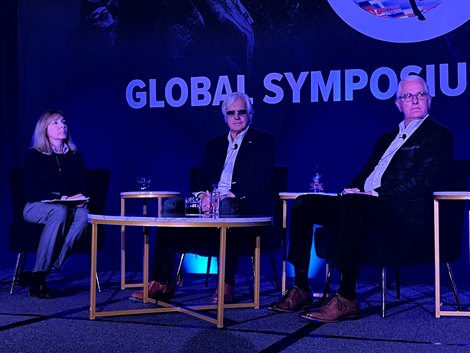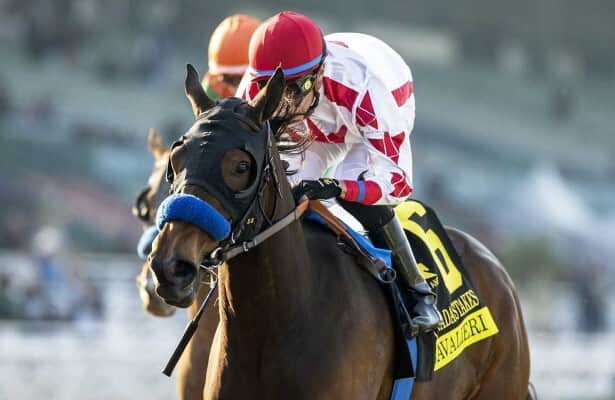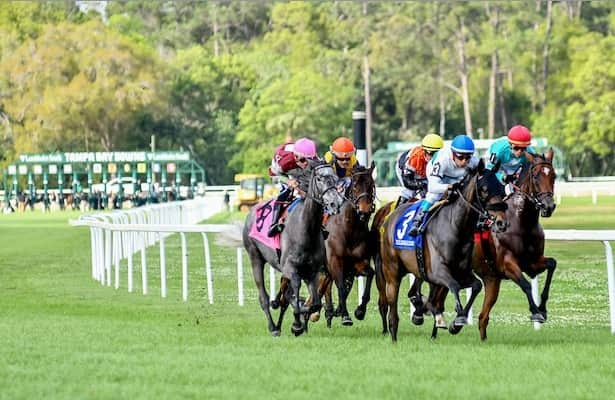Five years after speaking during a panel at the 2019 Global Symposium on Racing in Tucson, Ariz., Hall of Fame trainers and University of Arizona Race Track Industry Program graduates Todd Pletcher and Bob Baffert returned to the Symposium Dec. 10 to discuss developments in their careers.
With Amy Zimmerman, senior vice president and executive producer at Santa Anita Park, moderating a session called “Champions. Challenges. Commitment. A Conversation with Bob Baffert and Todd Pletcher,” the two elaborated on their recent achievements and setbacks. Although much of the conversation inspired smiles and laughter from the audience, the two commented on deeper topics such as equine drug testing, rising horse training costs, and Horseracing Integrity and Safety Authority regulation.
Pletcher, who received the University of Arizona’s Alumnus of the Year Award during a luncheon on Tuesday, spoke about contamination possibilities with equine drug testing that measures in minute amounts. His response came following a question about Forte , who tested positive for the non-steroidal anti-inflammatory drug meloxicam following the 2022 Hopeful Stakes (G1) at Saratoga Race Course—resulting in sanctions levied against Pletcher and the case being challenged in the court system. An upheld positive would result in Forte’s disqualification from the race.
The disclosure of that Hopeful positive came shortly after Forte was scratched from the 2023 Kentucky Derby (G1) due to an unrelated foot bruise.
In recent years, Pletcher has also faced penalties for drug infractions involving other horses in New York and Pennsylvania.
“The one thing Bob and I are aware of is the levels these are coming back at—you’re helpless as a trainer, I think,” he said.
He said he is concerned with the expenses of training horses, citing rising minimum wages, work visa costs, and increased expenses from added regulation.
“So my concern is, how long can we sustain passing on all these costs? People are just going to say, ‘You know what—it’s too expensive to participate,’ ” he said.
He and Baffert are among the most successful trainers in the sport, leading to many of their top male horses going off for financially rewarding careers at stud.
A series of equine drug infractions, most significantly from Medina Spirit in the 2021 Kentucky Derby, also resulted in penalties for Baffert. He served a 45-day suspension issued by the Kentucky Horse Racing Commission, and Medina Spirit was ultimately disqualified. The trainer was also banned from competition at Churchill Downs Inc. tracks for three years before the ban was rescinded this summer.
Baffert said he still watched the Kentucky Derby (G1) on television from afar in the years in which he could not participate.
For next year, Baffert has several leading Kentucky Derby prospects—among them Breeders’ Cup Juvenile 1-2 finishers Citizen Bull and Gaming , plus Barnes —who won his debut at Churchill Downs this fall with the trainer’s first starter since the CDI ban was lifted.
Pletcher is light in the 2-year-old male division, though he has several exciting horses scheduled to race next year as 4-year-olds,among them Locked , Mindframe , and Fierceness .
King: Fierceness ‘Doing Great’ After Hind Ankle Surgery
Zimmerman shifted the discussion to their legacies toward the end of the Tuesday conversation, but Baffert seemed more focused on the present.
“So right now, what we have in common,” he said, speaking of Pletcher, “is we’re looking for a good 2-year-old that’s going to turn 3.”
The Tuesday afternoon sessions concluded with two panels: “Investing in Racing’s Future: Perspectives From the Next Generation,” and another named “Fifty Ideas in 50 Minutes.” Members of the HISA Next Generation Advisory Group explored topics to drive growth and improve safety during the former panel, while panelists Alex Dadoyan, Dora Delgado, Liza Hendriks, Jay Hovdey, and Dick Powell fired off recommendations in the latter session.
A half dozen of the suggestions for the industry included incentivizing early betting, revamping television presentations around more relatable graphics, transitioning from claiming races to those organized on a ratings-based system, displaying odds in decimal rather than fractional form, putting the Eclipse Award presentations on the road, and embracing social media influencers.












